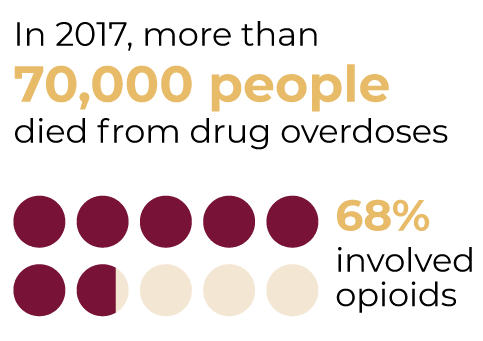Percocet Addiction and Treatment

Percocet Addiction and Treatment
What is Percocet?
Percocet is a prescription pain medication that is used to treat moderate to severe pain. It is made up of a combination of oxycodone (an opioid pain reliever) and acetaminophen (a non-opioid pain reliever commonly known as its brand name Tylenol).
Opioids are a category of medications that are either derived naturally from the opium poppy plant or are created in a laboratory. Opioids relax the body and relieve pain but can also make someone feel ‘high’ which can result ins opioid abuse. Oxycodone, one of the two ingredients found in Percocet, changes the way that the brain works by blocking feelings of pain. Acetaminophen, the second ingredient in Percocet, is a mild pain reliever that also reduces fevers.
What are Street Names for Percocet?
Percocet is the brand name of the medication containing oxycodone and acetaminophen. Due to its high potential for abuse, Percocet also has various street names. These names include ‘hillbilly heroin,’ ‘perks’ and ‘percs.’
What is Percocet Used For?
Percocet is typically used to relieve non-chronic moderate to severe pain. It is mostly used for short-term pain relief such as post-surgical pain or pain from an injury. This medication is not typically used long-term. Percocet changes the way that the brain perceives pain, allowing for pain relief and relaxation. It also induces a dopamine response in certain regions of the brain, creating feelings of pleasure and motivation.
When taken in large doses, Percocet can create a feeling similar to that of heroin that includes feelings of pleasure, calmness, and relaxation. For this reason, many people abuse Percocet by taking it in large doses, using it without a prescription, or crushing it, snorting it, injecting it, or otherwise using it not as directed.
What Schedule of Drugs is Percocet On?
The federal Drug Enforcement Administration (DEA) has labeled Percocet as a Schedule II drug, meaning that it has a high potential for abuse that can lead to dependence and addiction. For this reason, physicians are careful about prescribing Percocet as its use could have negative effects. While Percocet is deemed safe when prescribed for its intended uses, it also carries various risks, particularly when abused.
What You Should Know Before Taking Percocet
Not every drug is safe to take for everyone. There might be existing conditions with which an individual cannot take Percocet or medications currently being taken that interact badly with Percocet. There are also certain risks associated with Percocet. Below is a few things to be aware of before taking Percocet.
Using Percocet might conceal a possible diagnosis in people with severe abdominal conditions.
The oxycodone in Percocet might cause seizures or make seizures worse for people who already experience them.
Taking Percocet can put someone at a high risk of substance use disorder if the person has previously struggled with addiction or mental health disorders.
A person should avoid eating grapefruit or drinking grapefruit juice while using Percocet unless the doctor permits the person to do so. This is because grapefruit might increase side effects.
Use of this medication should not stop suddenly as withdrawal symptoms may occur.
A doctor should be notified of what medications or illicit drugs are also being taken as there are certain medications and drugs that can interact badly with Percocet.
What are Percocet's Side Effects?
As with any medication, there are possible side effects that can occur. Some common side effects of Percocet include:
Black Stool
Dark urine
Dry mouth
Fever
Loss of appetite
Skin rash
Chills
Dizziness
Fainting
A general feeling of discomfort
Low energy
Vomiting
Constipation
Drowsiness
Feelings of extreme happiness or sadness
Head pain/headache
Nausea
Weakness
Some infrequent side effects include:
Abdominal pain
Excessive sweating
Indigestion
Redness of the face and neck
Diarrhea
Fever
Itching
Dry mouth
Fluid in the legs, feet, arms, or hands
Nervousness
Some rare effects include:
Allergic reaction
Collapse of lung
Heart failure
Lower back/side pain
Sore throat
Ulcers
Confusion
Depression
Hives
Painful/difficult urination
Sores
Unusual bleeding/bruising
Cough
Hallucination
Liver failure
Skin blistering and peeling
Throat swelling
When to Seek Immediate Emergency Medical Help
If any signs of an allergic reaction to Percocet appear, including hives, difficulty breathing, swelling of the face, lips, tongue, or throat
When a person has slow breathing with long pauses, blue lips and are hard to wake up
In rare cases, acetaminophen can cause severe skin reactions that can be fatal
Signs of a liver problem: nausea, upper stomach pain, tiredness, loss of appetite, dark urine, clay-colored stools, and yellow skin/eyes
If there are any symptoms of serotonin syndrome: agitation, hallucinations, fever, sweating, shivering, fast heart rate, muscle stiffness, twitching, loss of coordination, nausea, vomiting, diarrhea
The side effects of Percocet are likely to be worse in older adults, those who are overweight, malnourished, or debilitated.
What are the Long-term Effects of Percocet Use?
Although Percocet is meant to be used for the short term as a fast-acting pain reliever, in some instances it has been used long term. Possible health effects of long term Percocet use include:
Addiction
Decreased testosterone levels in men
Fertility issues
Kidney failure
Liver damage
Osteoporosis
Physical and psychological dependence
Severe constipation
Trouble urinating
Tolerance
Weakened immune system
What are the Symptoms of Percocet Overdose?
If too much Percocet has been taken, there is an increased risk of overdose. Percocet affects the central nervous system, and taking too much of it can slow breathing and be fatal. Symptoms of overdose include:
Blue lips or skin
Change/loss of consciousness
Cold, clammy skin
Coma
Difficulty breathing
Discomfort
Dizziness
Extreme fatigue
Fainting
Low blood pressure
Slowed pulse
Slow and shallow breathing
If you suspect that you or someone you know is overdosing on Percocet, seek emergency medical help immediately.
What are the Symptoms of Percocet Withdrawal?
Withdrawal occurs when use of a substance suddenly stops after being taken for a significant amount of time. The reason that withdrawal occurs is that over time, the body becomes used to the substance and adjusts itself to functioning with the drug.
This is called dependence, which reflects actual physiological changes in the brain that results in dependence on the drug to feel ‘normal’. When someone stops taking the drug suddenly, the body reacts to the lack of the substance, causing unpleasant symptoms as the body struggles to function without it.
Symptoms of Percocet withdrawal include:
Abdominal cramps
Anorexia
Cravings
Excessive tiredness
Increased heart rate and blood pressure
Irritability
Nausea
Pain attack
Severe sneezing
Tremors
Anxiety
Chills/hot flashes
Dizziness
Flu-like symptoms
Insomnia
Muscle pain and weakness
Nervousness
Restlessness
Stomach ache
Vomiting
Can You Become Addicted to Percocet?
Yes, you can. A typical misconception about prescription opioids is that they are safe to take because a doctor prescribes them. While they are fairly safe to take as prescribed, that does not mean that they cannot be abused.
When Percocet is abused, there is a greater risk of developing a dependence and becoming an addiction. Once dependence occurs there is a greater likelihood of developing a tolerance towards it, meaning larger doses must be taken to feel the same effects. This leads to a cycle of using more Percocet more frequently to be able to feel the same previous effects.
In the past, prescription painkiller abuse was typically associated with middle or upper-class people. Today, opioid use disorder affects people of all ages, races, economic classes, and social circles. Additionally, addiction doesn’t just affect people who use Percocet recreationally without a prescription, it also affects people who have been legitimately prescribed the pain killer and developed a tolerance. In fact, there are many instances of the average person who has never experienced a use disorder before, developing a dependence on Percocet after being prescribed it for pain.
What Are Some Risk Factors for Addiction?
Hereditary Risk Factors
Personal or family history with addiction
Personal or family history with co-occurring mental illness
Environmental Risk Factors
Early childhood trauma
Poverty
Unemployment
Easy Access
Doctor's prescription
A family member with prescription
What are the Diagnostic Criteria for Opioid Use Disorder?
The 5th and most recent edition of the Diagnostic and Statistical Manual of Mental Disorders created by the American Psychiatric Association outlines the following criteria for diagnosing opioid use disorder:1
Opioids are often taken in larger amounts or over a longer period than was intended
There is a persistent desire or unsuccessful efforts to cut down or control opioid use
A great deal of time is spent in activities necessary to obtain the opioid, use the opioid or recover from its effects
Craving or a strong desire to use opioids
Recurrent opioid use resulting in a failure to fulfill major role obligations at work, school, or home.
Continued opioid use despite having persistent or recurrent social or interpersonal problems caused or made worse by the effects of opioids.
Important social, occupational, or recreational activities are given up or reduced because of opioid use.
Recurrent opioid use in situations in which it is physically hazardous.
Continued use despite knowledge of having a persistent or recurrent physical or psychological problem that is likely to have been caused or exacerbated by opioids.
Tolerance, as defined by either of the following: Need for markedly increased amounts of opioids to achieve intoxication or desired effect, markedly diminished effect with continued use of the same amount of opioid
Withdrawal, as manifested by either of the following: Characteristic opioid withdrawal syndrome. The same (or a closely related) substance is taken to relieve or avoid withdrawal symptoms
The DSM-5 Severity Scale
The severity of the substance use disorder depends on how many criteria apply to an individual.
Mild
2-3 Symptoms
Moderate
4-5 Symptoms
Severe
6+ Symptoms
The diagnosis of a substance use disorder can only be given by a licensed professional; however, being aware of the diagnostic criteria might help with determining whether you or someone you know is suffering from an addiction.
How Big is the Percocet Addiction Problem?
Because Percocet is part of a larger classification of drugs known as opioids, most data and statistics regarding opioid abuse, addiction, and death look at the whole category of opioids rather than each individual drug. That being said, the statistics surrounding opioid use reveal a startling picture of the opioid epidemic. For context, the category of opioids includes naturally occurring opioids such as morphine and codeine, semi-synthetic opioids such as oxycodone, hydrocodone, and heroin, and synthetic opioids, which include methadone, fentanyl, tramadol. From 1999 to 2017, more than 702,000 people died from a drug overdose.2

In 2017, more than 70,000 people died from drug overdoses, with almost 68% of those deaths involving prescription or illicit opioids.2 This makes drug overdoses one of the leading causes of injury-related deaths in the United States.2 The startling thing about that is both that drug overdoses can be prevented but also that an over-prescription of opioids to patients has played a large part in the overdose problem. In other words, the health care system itself is partially at fault for the opioid epidemic.
In 2016 and 2017, more than 130 people died every day in the US from an opioid-related drug overdose.3
In 2018, an estimated 10.3 million Americans over the age of 12 misused opioids. 9.9 million of these people reported abusing prescription pain killers, such as Percocet.3
Individuals with an addiction to prescription opioids are 40 times more likely to become addicted to heroin.3
What States Have the Highest Rates of Death Due to Drug Overdose?
In 2017, the states with the highest rates of drug-overdose deaths were West Virginia (57.8 per 100,000), Ohio (46.3 per 100,000), Pennsylvania (44.3 per 100,000), the District of Colombia (44.0 per 100,000) and Kentucky (37.2 per 100,000).2
In 2017, the states with the highest opioid prescription rates were Alabama, Arkansas, Mississippi, and Tennessee.3

What are the Treatment Options for Percocet Addiction?
If you or someone you love is struggling with Percocet addiction, don’t be afraid to ask for help! There is no shame in asking for help from friends, family, and professionals. Substance abuse treatment is a difficult process and requires a good support system.
Detox Programs
The first step to treating Percocet addiction is to stop using Percocet. This should not happen cold-turkey and needs to occur gradually or through a detox program. The best way to stop using Percocet is through supervised detox. This is because medical supervision while detoxing can help manage withdrawal symptoms and help to avoid relapse. Detoxification happens slowly and over a period of time so that the body has time to get used to lower doses of Percocet.
After a successful detox, there are a variety of treatment options available. Typically, treatment is always recommended after detox because those who just go through detox and don’t go to treatment have higher rates of relapse. Treatment options include:
Inpatient and outpatient treatment programs, such as behavioral modification programs or residential 30, 60, or 90-day programs.
Medically assisted treatment, such as the use of methadone or buprenorphine to help relieve cravings and withdrawal symptoms from Percocet.
Mental Health Therapy, such as cognitive-behavioral therapy. This therapy helps identify causes, triggers, and patterns of behavior surrounding substance use disorder.
Aftercare programs, such as sober living environments, check-ins and follow up counseling sessions that help to prevent relapse.
12-Step Recovery programs, such as Narcotics Anonymous. Such programs focus on peer support and having the support of people going through the same things.
Combined Treatments During Recovery
Typically, multiple different treatments will be combined to create a treatment plan that is tailored to the individual. Most often, medically assisted treatments will be combined with therapy and counseling. The medication helps with withdrawal symptoms, allowing stability until successful completion of therapy and counseling, which targets the root causes of addiction rather than just the symptoms.
Resources
- American Psychiatric Association: Diagnostic and Statistical Manual of Mental Disorders: Diagnostic and Statistical Manual of Mental Disorders, Fifth Edition. Arlington, VA: American Psychiatric Association, 2013
- https://www.cdc.gov/drugoverdose/index.html
- https://www.cnn.com/2017/09/18/health/opioid-crisis-fast-facts/index.html















